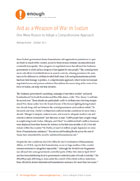
Since Sudan’s government denies humanitarian aid organizations permission to operate freely in much of the country, access to those in need remains circumscribed and constantly in jeopardy. Slow progress on negotiated access has allowed the Sudanese government to wield aid as a weapon of war against its own people. The central government only allows food distributions in areas it controls, refusing permission for assistance to be delivered to civilians in rebel-held areas. Life-saving humanitarian activity has been held hostage to politics. A comprehensive approach, which looks beyond just negotiated access and pursues solutions that address the issues lying at the roots of violence in Sudan, can help end that dynamic.
The Sudanese government’s punishing campaign of starvation warfare and aerial bombardment in South Kordofan and Blue Nile states, or the “Two Areas,” is well into its third year. These attacks are particularly costly to civilians since the long-marginalized Two Areas earlier bore the brunt of some of the fiercest fighting during Sudan’s two-decade-long civil war between the central government and southern rebels. To the north and west, Darfur’s civilians have suffered similar conditions for more than a decade. Hunger is rampant, water is scarce, and access to adequate medical care and schools is almost nonexistent. Just this year, at least 75,000 people have sought refuge in neighboring South Sudan, Ethiopia, and Chad. An additional half a million Sudanese were displaced from their homes by violence in the first nine months of 2013 but still remain within the country. In Darfur, at least 3.2 million people depended on some form of humanitarian assistance. Recent record-breaking floods across the rest of Sudan have intensified the need for unfettered humanitarian aid.
Despite the dire conditions, the U.N. Office for the Coordination of Humanitarian Affairs, or OCHA, reports that humanitarian access to large swathes of the country remains restricted or altogether impossible.

